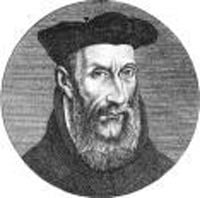
Nostradamus, (December 14, 1503- July 1, 1566) born Michel de Nostredame, is one of the world’s most famous authors of prophecies.
He is most famous for his book ‘Les Propheties’, which consists of rhymed quatrains (4-line poems) grouped into sets of 100, called Centuries.
Born in Saint-Remy de Provence, in the south of France, he was the son of either a Jewish grain dealer or a prosperous notary. He was Jewish by birth, but since the authorities of Provence insisted that Jews either move or convert to Catholicism, his family outwardly converted and practiced the Roman Catholic faith. As a child, Nostradamus showed an aptitude for mathematics and astronomy/astrology. In fact, his teachers were upset by his defence of Copernicus and astronomy/astrology. He studied medicine at the University of Montpellier, and finished his baccalaureate exams in 1525.
The plague soon disrupted his schooling and he travelled around France helping cure the sick with ideas that included a better diet, clean bedding, clean water and clean streets. It was whilst Nostradamus was traveling that he met and exchanged information with various underground Renaissance doctors, alchemists, Kabalists and mystics—a practice he would continue throughout most of his life. He was also skilled as an apothecary, having created a ‘Rose pill’ (apparently mostly a large dose of Vitamin C) which was widely believed to alleviate the plague. In 1529 he returned to Montpellier to receive his doctorate and then teach, but the conservative views of the university forced him once again to establish a medical practice and help cure the plague.
He settled down in 1547 in Salon where he married again a rich widow named Anne Ponsarde Gemelle and had six children—three daughters and three sons. He began to move away from medicine and towards the occult, at the same time opening a cosmetics business. He wrote an almanac in 1550, and was so encouraged by its success that he decided to write one yearly. He then began his project of writing 1,000 quatrains (four-line poems), which form the supposed prophecies for which he is famous today. Due to the scrutiny and pressure of the Inquisition, however, he devised a method of obscuring his meaning by using word games and a mixture of languages such as Provencal, Greek, Latin, Italian, Hebrew and Arabic.
The quatrains, written in a book titled ‘Les Propheties’, received a mixed reaction when they were published. Some people thought Nostradamus was a servant of evil, a fake, or insane, while many of the elite thought his quatrains were spiritually inspired prophecies.
By 1566 Nostradamus’ gout, which had painfully plagued him for many years and made movement very difficult, finally turned into dropsy. One night in July, he made it known that he wished to spend his last night alone, and when his secretary Chavigny took his leave with an “Until tomorrow, Master?” Nostradamus replied to him, “You will not find me alive by sunrise.” The next morning Chavigny led friends and family upstairs to the study and found Nostradamus’ body lying on the floor between the bed and a makeshift bench.

